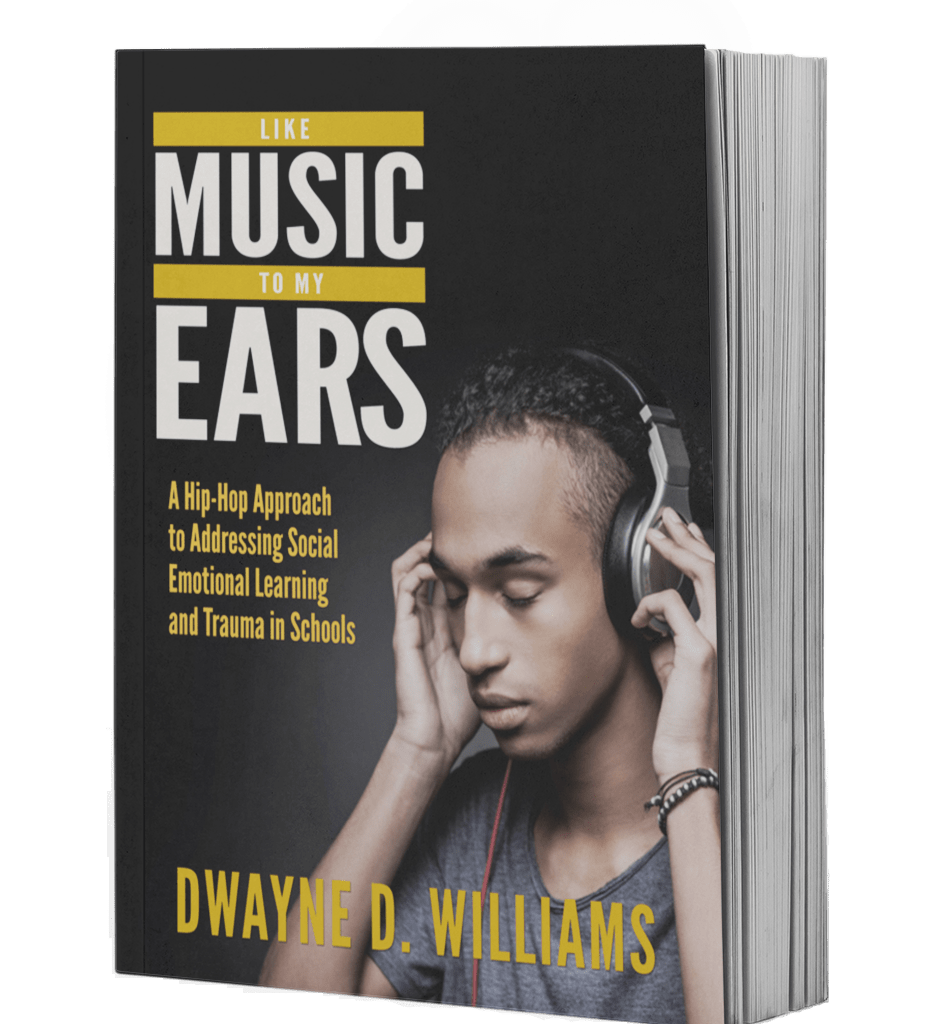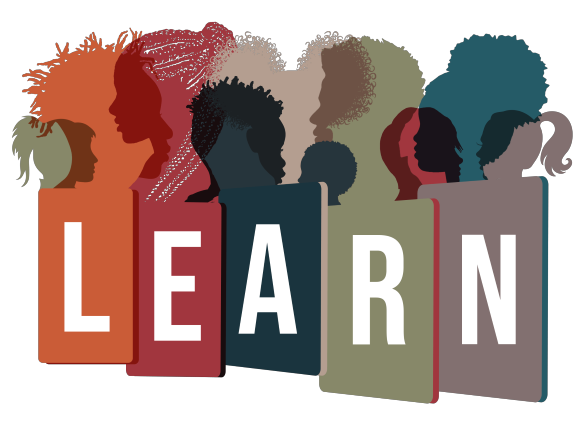

A Hip-Hop Approach to Addressing Social Emotional Learning (SEL) and Trauma in Schools
While there are “evidence-based” curricula available to help students develop social and emotional learning (SEL) competencies and process traumatic events, many students in general and culturally diverse learners in particular, refuse to participate in traditional school-based groups that address SEL and trauma.
In the curriculum Like Music to My Ears: A Hip-Hop Approach to Addressing Social Emotional Learning & Trauma in Schools, Dr. Williams reveals proven strategies that educators can use to get students to say “Yes!” to developing SEL competencies and “Yes!” to dealing with stress and trauma in schools. Not only does Williams share how to adapt SEL and trauma-informed curricula for students who love hip-hop—but also he details exactly how to get your students to help you do it.
Order your copy today, and learn how to create hip-hop SEL and trauma-informed groups that students describe as relevant, meaningful, and stimulating!
About the Curriculum
In Like Music to My Ears, Dwayne D. Williams shows how to use hip-hop cultural elements to develop social emotional learning (SEL) competencies, including self-awareness, self-management, social awareness, relationship skills, and responsible decision-making.
These SEL competencies have been effective at increasing academic engagement and decreasing suspension rates among students who completed the program. Additionally, Williams provides evidence-based strategies practitioners can use to help students process traumatic events—and he shares stress reduction strategies that all students can use at any time.

About the Author
Dr. Williams is the CEO of Begin With Their Culture, an organization that helps districts adapt instructional practices to meet the cultural needs of culturally diverse learners. He is the author of 7 books, including An RTI Guide to Improving Performance of African American Students. He has used his curriculum, Like Music to My Ears: A Hip-Hop Approach to Addressing Social and Emotional Learning and Trauma in Schools, with hundreds of students. He coaches practitioners through the process of designing Tier 2 groups that integrate SEL, cognitive behavioral theory principles, and hip-hop culture. Dr. Williams earned his PhD from the University of Illinois at Chicago (UIC), where he studied curriculum and instruction.
Evidence of Effectiveness
Students who interacted with the curriculum demonstrated measurable growth in their ability to
● become self-aware
● manage emotions when frustrated and distressed
● identify resources within their school and community to help meet goals
● develop and maintain relationships with teachers and administrators they disliked—and
● make responsible decisions at school and within their communities.
Additionally, students who refused to share their narratives around trauma became receptive to processing traumatic events and learned stress-reduction strategies to calm themselves when anxious, afraid, and stressed. Students also demonstrated academic growth in the classroom.
What’s Included?
Step-by-step Guide
A step-by-step map to creating hip-hop SEL and trauma-informed groups–and how you can get your students to help you do it.
18 Engaging Lessons
All 18 lessons have been tested and shown to increase academic engagement.
List of Rap Song Ideas
Rap songs aligned with the 5 SEL competencies.

Culturally Responsive
Contains information on race and culture and culturally responsive instruction of SEL competencies and trauma-informed supports.
Progress Monitoring Tool
A simple, evidence-based tool students can use to monitor their progress.
18 Action-item Agendas
18 action-item agendas to bring hip-hop SEL and trauma-informed lessons to life.
TESTIMONIALS
The Curriculum in Action
In the following videos, Dr. Williams uses activities from the curriculum Like Music to My Ears: A Hip-Hop Approach to Addressing SEL and Trauma in Schools.
Rap Cypher
Processing Traumatic Events
This is America
Curriculum Activities
Frequently Asked Questions
Who is The Curriculum Written For?
Like Music to My Ears was written for students who embrace hip-hop, including students who embrace rap music, dance, produce beats, and write poetry to rhythmic beats. The curriculum has been used with students from elementary through high school. Practitioners who use the curriculum with younger students will have to make adjustments to some of the songs included within the curriculum.
What Makes this Curriculum Different from Previous Editions?
Unlike previous editions, this curriculum draws from the Cultural Historical Activity Theory and includes activities that are geared toward helping students develop SEL competencies and process traumatic events, using cognitive behavioral therapy (CBT) principles. Additionally, this edition places emphasis on acknowledging how students “experience” the world as a culture sharing group and focuses on stress-reduction strategies students can use to deal with stressful and traumatic experiences.
What is the Best Approach to Implement This Curriculum?
If possible, it is best to implement all 18 lessons. The first four lessons will prepare students for the group process and ease stress that is associated with attending groups. While it is best to implement all 18 lessons, practitioners can create 6-week, 8-week, 10-week, 12-week, and 14-week group sessions, based on their group goals. Practitioners are also encouraged to identify agenda activities that are most relevant to the goals of their group, and to implement those activities only, instead of attempting to cram “a list” of activities within one lesson.
Are There any Videos that Practitioners Can View to Learn How to Implement Activities from this Curriculum?
Definitely. Practitioners are encouraged to join the Like Music to My Ears Community, where they can access free resources, including how-to videos, recommendations from the author Dwayne D. Williams, and short articles about the curriculum. Practitioners can join the community here. Within the community, members will have an opportunity to learn how other practitioners are using the curriculum and how students from across the country are responding to the activities. Community members are encouraged to share successes and roadblocks they are experiencing with their groups—and to enter the community ready to learn strategies from Dwayne D. Williams on how to remove barriers in order to enhance the group process.
What Theoretical Framework Does the Curriculum Draw From?
The curriculum draws from the Cultural Historical Activity Theory (CHAT), which emphasizes using cultural tools to mediate learning. The curriculum also draws from the principles of phenomenology, in which emphases are placed on understanding how students who embrace hip-hop as a culture sharing group experience various phenomena, including how they experience America in general and how they experience their schools in particular.
Do I Have to be Familiar With Hip-Hop Culture to Implement this Curriculum?
Practitioners do not have to be knowledgeable about hip-hop culture in order to implement this curriculum. The curriculum is designed such that group members and leaders will learn about hip-hop through activities within the lessons. Also, it is important to note that this curriculum is not about becoming “hip-hop experts,” although hip-hop activities are used to meet goals. Rather, the curriculum is about developing SEL competencies and learning effective strategies to process trauma.

